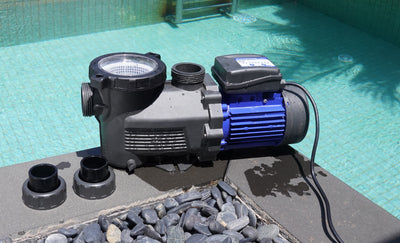Why There’s Sand in Your Pool and How to Get It Out
Finding sand in your pool can be a confusing and frustrating experience, especially when it seems to appear out of nowhere. Whether you’ve just opened your pool for the season or have noticed the problem during regular maintenance, it’s important to identify the cause and resolve it quickly. The good news is that sand in the pool usually points to an issue with your pool’s filtration system, specifically if you use a sand filter. Here's a step-by-step guide on how to get rid of the sand and prevent it from coming back.
Why Is There Sand in My Pool?
The main culprit behind sand appearing in your pool is likely a malfunction within your sand filter. If you’re using a sand filter, it’s designed to capture debris and particles from the water. However, when certain components of the filter break or wear down, sand can escape and end up in your pool.
Broken Filter Parts
There are a few key parts of the sand filter that could be damaged, causing sand to flow into your pool:
-
Standpipe
The standpipe is a rigid pipe running down the center of the sand filter. While it’s made of strong plastic, it can crack over time. If this happens, sand can escape through the pipe and get into the pool. -
Laterals
At the bottom of the filter are laterals—small, perforated pipes that allow clean water to exit the filter while keeping sand contained. If one or more of these laterals crack or become damaged, sand can pass through and end up in the pool.
In most cases, it’s the laterals that are more prone to cracking than the standpipe. However, both parts should be inspected and replaced if necessary.
How to Fix a Broken Sand Filter
If you suspect that your sand filter is the cause of the sand in your pool, it’s important to fix it as soon as possible. Here’s how you can address the issue:
-
Order Replacement Parts
Before beginning any repairs, ensure you have replacement laterals and standpipe parts on hand. It’s always a good idea to keep some spare parts so you can quickly handle any future repairs. -
Replace the Damaged Parts
To replace the standpipe or laterals, you’ll need to remove the old filter sand first. Once the old sand is removed, inspect the parts for cracks. If the laterals or standpipe are damaged, replace them with new ones. Reassemble the filter, refill it with fresh sand, and ensure everything is properly sealed.
How to Remove Sand From Your Pool
Once your sand filter is fixed, you can tackle the sand that’s already in the pool. Here’s how to remove it:
-
Concentrate the Sand
Use a pool brush to gather the sand into one area of the pool. This will make it easier to vacuum up. -
Vacuum the Sand
Set your filter’s multiport valve to the “Filter” setting, and use a manual pool vacuum to suck up the sand. Make sure the vacuum is properly connected to the filtration system so that the sand is directed back into the filter. -
Test and Balance Pool Water
After removing the sand, check the chemical levels in your pool using a test kit. Add any necessary chemicals to restore proper balance, especially if the sand removal process disturbed the water chemistry. -
Maintain Regular Cleaning
Regular cleaning and maintenance of your pool filter can help prevent future sand issues. Be sure to check the filter components periodically to ensure everything is in good working order.
What if the Substance in My Pool Isn’t Sand?
If you find a substance in your pool that looks like sand but don’t have a sand filter, it might not actually be sand. In some cases, yellow pool algae—also known as mustard algae—can resemble sand particles. To determine whether it’s algae, use a pool brush to push the substance around. If it clouds up and disperses, it’s likely mustard algae, not sand.
In this case, you’ll need to treat the pool with an appropriate algae killer, such as a pool shock treatment, to eliminate the algae and prevent it from coming back.
Keep Your Pool Sand-Free
Finding sand in your pool doesn’t have to be a major headache. By identifying the issue with your sand filter and fixing it promptly, you can remove the sand and prevent future occurrences. Regular maintenance and monitoring of your pool filter will go a long way in ensuring your pool stays clean, clear, and sand-free.
If you’re looking for high-quality pool maintenance solutions, AQUASTRONG offers a range of reliable products to help you keep your pool in excellent condition all year round. Whether it's pool pumps, filtration systems, or accessories, AQUASTRONG has you covered.

